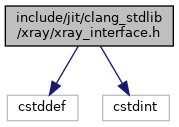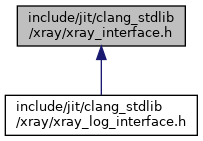#include <cstddef>#include <cstdint>

Go to the source code of this file.
Enumerations | |
| enum | XRayEntryType { ENTRY = 0 , EXIT = 1 , TAIL = 2 , LOG_ARGS_ENTRY = 3 , CUSTOM_EVENT = 4 , TYPED_EVENT = 5 } |
| Synchronize this with AsmPrinter::SledKind in LLVM. More... | |
| enum | XRayPatchingStatus { NOT_INITIALIZED = 0 , SUCCESS = 1 , ONGOING = 2 , FAILED = 3 } |
Functions | |
| int | __xray_set_handler (void(*entry)(int32_t, XRayEntryType)) |
| Provide a function to invoke for when instrumentation points are hit. | |
| int | __xray_remove_handler () |
| This removes whatever the currently provided handler is. | |
| int | __xray_set_handler_arg1 (void(*entry)(int32_t, XRayEntryType, uint64_t)) |
| Use XRay to log the first argument of each (instrumented) function call. | |
| int | __xray_remove_handler_arg1 () |
| Disables the XRay handler used to log first arguments of function calls. | |
| int | __xray_set_customevent_handler (void(*entry)(void *, std::size_t)) |
| Provide a function to invoke when XRay encounters a custom event. | |
| int | __xray_remove_customevent_handler () |
| This removes whatever the currently provided custom event handler is. | |
| int | __xray_set_typedevent_handler (void(*entry)(uint16_t, const void *, std::size_t)) |
| Set a handler for xray typed event logging. | |
| int | __xray_remove_typedevent_handler () |
| Removes the currently set typed event handler. | |
| uint16_t | __xray_register_event_type (const char *event_type) |
| XRayPatchingStatus | __xray_patch () |
| This tells XRay to patch the instrumentation points. | |
| XRayPatchingStatus | __xray_unpatch () |
| Reverses the effect of __xray_patch(). | |
| XRayPatchingStatus | __xray_patch_function (int32_t FuncId) |
| This patches a specific function id. | |
| XRayPatchingStatus | __xray_unpatch_function (int32_t FuncId) |
| This unpatches a specific function id. | |
| uintptr_t | __xray_function_address (int32_t FuncId) |
| This function returns the address of the function provided a valid function id. | |
| size_t | __xray_max_function_id () |
| This function returns the maximum valid function id. | |
| void | __xray_init () |
| Initialize the required XRay data structures. | |
Enumeration Type Documentation
◆ XRayEntryType
| enum XRayEntryType |
Synchronize this with AsmPrinter::SledKind in LLVM.
| Enumerator | |
|---|---|
| ENTRY | |
| EXIT | |
| TAIL | |
| LOG_ARGS_ENTRY | |
| CUSTOM_EVENT | |
| TYPED_EVENT | |
Definition at line 23 of file xray_interface.h.
◆ XRayPatchingStatus
| enum XRayPatchingStatus |
| Enumerator | |
|---|---|
| NOT_INITIALIZED | |
| SUCCESS | |
| ONGOING | |
| FAILED | |
Definition at line 88 of file xray_interface.h.
Function Documentation
◆ __xray_function_address()
This function returns the address of the function provided a valid function id.
We return 0 if we encounter any error, even if 0 may be a valid function address.
◆ __xray_init()
|
extern |
Initialize the required XRay data structures.
This is useful in cases where users want to control precisely when the XRay instrumentation data structures are initialized, for example when the XRay library is built with the XRAY_NO_PREINIT preprocessor definition.
Calling __xray_init() more than once is safe across multiple threads.
◆ __xray_max_function_id()
|
extern |
This function returns the maximum valid function id.
Returns 0 if we encounter errors (when there are no instrumented functions, etc.).
◆ __xray_patch()
|
extern |
This tells XRay to patch the instrumentation points.
See XRayPatchingStatus for possible result values.
◆ __xray_patch_function()
|
extern |
This patches a specific function id.
See XRayPatchingStatus for possible result values.
◆ __xray_register_event_type()
|
extern |
◆ __xray_remove_customevent_handler()
|
extern |
This removes whatever the currently provided custom event handler is.
Returns 1 on success, 0 on error.
◆ __xray_remove_handler()
|
extern |
This removes whatever the currently provided handler is.
Returns 1 on success, 0 on error.
◆ __xray_remove_handler_arg1()
|
extern |
Disables the XRay handler used to log first arguments of function calls.
Returns 1 on success, 0 on error.
◆ __xray_remove_typedevent_handler()
|
extern |
Removes the currently set typed event handler.
Returns 1 on success, 0 on error.
◆ __xray_set_customevent_handler()
|
extern |
Provide a function to invoke when XRay encounters a custom event.
◆ __xray_set_handler()
|
extern |
Provide a function to invoke for when instrumentation points are hit.
This is a user-visible control surface that overrides the default implementation. The function provided should take the following arguments:
- function id: an identifier that indicates the id of a function; this id is generated by xray; the mapping between the function id and the actual function pointer is available through __xray_table.
- entry type: identifies what kind of instrumentation point was encountered (function entry, function exit, etc.). See the enum XRayEntryType for more details.
The user handler must handle correctly spurious calls after this handler is removed or replaced with another handler, because it would be too costly for XRay runtime to avoid spurious calls. To prevent circular calling, the handler function itself and all its direct&indirect callees must not be instrumented with XRay, which can be achieved by marking them all with: __attribute__((xray_never_instrument))
Returns 1 on success, 0 on error.
◆ __xray_set_handler_arg1()
|
extern |
Use XRay to log the first argument of each (instrumented) function call.
When this function exits, all threads will have observed the effect and start logging their subsequent affected function calls (if patched).
Returns 1 on success, 0 on error.
◆ __xray_set_typedevent_handler()
|
extern |
Set a handler for xray typed event logging.
The first parameter is a type identifier, the second is a payload, and the third is the payload size.
◆ __xray_unpatch()
|
extern |
Reverses the effect of __xray_patch().
See XRayPatchingStatus for possible result values.
◆ __xray_unpatch_function()
|
extern |
This unpatches a specific function id.
See XRayPatchingStatus for possible result values.